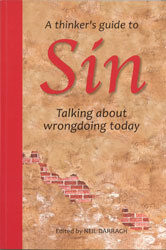
Accent Publications, 2010,
RRP $39.95
Reviewed by Karyl Davison.
MOST of us have puzzled in recent years about the way sin is understood in Australian society.
Although for some of us it remains a religiously meaningful term, this has somehow become less than helpful for many.
Even in the church we are no longer sure what sin is.
So how can we speak about wrong doing in a way that is meaningful both in the church and our wider society today?
This is the conundrum A thinker’s guide to Sin is trying to address.
The book is a collection of articles, coming out of New Zealand, written by over 20 authors from different Christian traditions.
The aim is to articulate, for Christians as well as interested members of other religions and the wider society, a broad
understanding of sin and its contemporary equivalents.
Thus it does not assume a Christian readership, although it will probably be of most interest to people from a Christian
background.
The collection is divided into four parts.
Part one deals with some of the shifts that have taken place in the way sin is talked about.
Part two explores what we actually mean by the concept of sin and wrongdoing in our lives.
In recognition that there are many shades of grey when we try to define wrongdoing, part three looks at the complexity involved in defining the boundaries of sin and wrongdoing.
Finally, part four discusses some new kinds of sin, those areas of wrongdoing which may not have featured previously
such as environmental, rural and intergenerational wrongdoing.
The underlying message is the hope that in discussing sin, or wrongdoing, we might be more able to overcome, or even, eliminate it.
It seems clear today, with the aid of new understandings in psychology and theology, that traditional emphasis on individual sin is neither nourishing or empowering, nor does it recognise sin as embedded within many of the structures of our society.
This book offers thoughtful reassessment of this key theological concept.
 JourneyOnline
JourneyOnline






